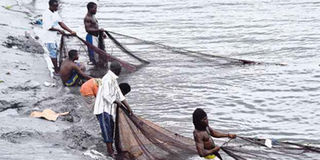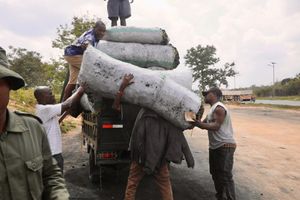The resurgence of blast fishing

Fishermen pull their nets from the lake after casting them to catch
fish. PHOTO|FILE
What you need to know:
Mr Jason Rubens, the director of Sound Ocean Ltd, a marine environment organisation, said blast-fishing occurred in all 16 Mainland coastal districts and municipalities with Dar es Salaam, Tanga, Mtwara and Lindi coastal areas cited as hotspots due to lack of regulation.
Tanga. A marine scientist yesterday made damning revelations on the extent of dynamite fishing in some coastal areas of Tanzania, saying the resurgence of blast-fishing has been driven by the availability of illegally-traded industrial explosives and detonation materials, in part, imported for use in the mining sector.
Mr Jason Rubens, the director of Sound Ocean Ltd, a marine environment organisation, said blast-fishing occurred in all 16 Mainland coastal districts and municipalities with Dar es Salaam, Tanga, Mtwara and Lindi coastal areas cited as hotspots due to lack of regulation.
For example, said Mr Rubens, beach management units (BMUs), with the support of WWF, monitored blast frequency at Songosongo in Lindi Region for 15 months up to late October 2014 and recorded 8,765 blasts an average of 21 per day.
Mr Rubens, also a marine environmental consultant with WWF,the world’s leading conservation organisation, was speaking at a seminar organised by the National Environment Management Council
(NEMC) and supported by WWF Tanzania.
The two-day seminar has brought together players in the fisheries industry, including the judiciary,the police, fisheries department,the Director of Public Prosecution and local government authorities to build understanding of the magnitude of the problem and how to resolve it.
In his presentation entitled: Status of Blast Fishing in Tanzania Mainland Waters September 2015, Mr Rubens said enforcement to fight blast fishing has been weak since 2002 and was caused by various reasons, including lack of operational funding, corruption, lack of investigative approach and intimidation
of fisheries officers by illegal fishers, Mr Rubens said in the western Indian Ocean, blast fishing only occurred in Tanzania, giving an indicative 50-year trend in that kind of fishing in the country.
He said a drop in blast fishing from 1997 to 2002 followed Operation Pweza which was conducted by
the navy and its subsequent development of camps along the Tanga coast in response to reports on illegal immigration across the Kenyan border.
“Navy personnel were recalled to permanent bases in 2002 which immediately led to resurgence in blast fishing starting in Tanga,” said the marine scientist. “Blast fishing is a shame to thenation,” said the NEMC director general, Eng Bonaventure Baya, adding that the malpractice which has grown deep roots was also detrimental to the marine ecosystem.
Dr Christopher Muhando, a senior researcher with the Institute of Marine Sciences based in Zanzibar, and Ms Rose Sallema Mtui, the NEMC head of Environmental Research Coordination, said destructive fishing practices damaged coral reefs, which were breeding grounds for fish.
They said coral reefs were highly adapted to living and growing slowly and when damaged they took many years to recover and in some circumstances they never recovered at all.
Dr Muhando and Ms Mtui said reefs provided many useful goods and services, adding that coastal livelihoods was highly dependent on coral reefs.
They said blast fishing demolished the coral framework reduce the complex three dimensional topography to rubbles, denying living habitats for million of reef organisms and disrupting provision of all services and goods.
The two scientists said coral reef destruction was associated with low fish productivity and rampant poverty and called for the protection of coral reefs for the prosperity of the
nation.
“Time is now to get rid of blast fishing completely,” they said in their joint presentation entitled: The Value of Coral Reefs and Environmental and Socio-economic Impacts of Blast Fishing in Tanzania.
The Tanga regional administrative secretary, Mr Salum Mohamed Chima, said it took more than 60 years to recover damaged coral reefs, adding: “Some of us, even our children, will not be there when some of the damaged coral reefs areSome of us, even our children, will not be there when some of the damaged coral reefs are recovered.”
He said Tanzania was the only country in the region where dynamite fishing was practiced, adding that neighbouring countries such as Kenya, Mozambique and Indian Ocean Island states have already controlled of blasting fish.
Mr Magese Emmanuel Bulayi, a principal fisheries officer in the Fisheries Division, said efforts were now in place aimed at curbing blast recovered.”
He said Tanzania was the only country in the region where dynamite fishing was practiced, adding that neighbouring countries such as Kenya, Mozambique and Indian Ocean Island states have already controlled of blasting fish.
Mr Magese Emmanuel Bulayi, a principal fisheries officer in the Fisheries Division, said efforts were now in place aimed at curbing blastfishing. He said the government had launched the Multi-Agency Task
Team (MATT) to find a lasting and effective solution to escalating cases of environmental and wildlife crime taking place in Tanzania, including blast fishing.
“The focus of MATT will be to target the individuals and networks that control this illegal trade, bring them to justice and seize any assets obtained through their crimes,” said Mr Bulayi.
Mr Rubens said the launch of MATT in July, this year, showed there was now political will to fight dynamite fishing which has been in place for over 50 years.
“MATT has already actively been working on blast fishing for the past 12 months with support from EUSmartFish project,” said the marine scientist.
Tanga regional staff officer, Senior Superintendent of Police (SSP) Mayala Towo, admitted: “Blast fishing is a big headache. It needs committed collaborative cooperation by all stakeholders.”
He added: “If our forefathers were engaged in blast fishing we couldn’t have found fish today.”




